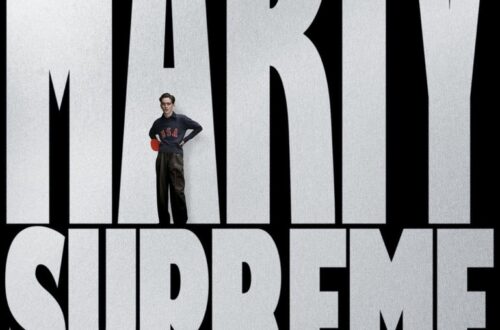Shawn Simmons makes an ambitious leap from television to feature filmmaking with Eenie Meenie, an action-thriller that opens today on Hulu and Disney+. The film is equal parts high-octane chase movie and character-driven caper, a hybrid that seeks to honor the muscular car-crash spectacles of the 1970s while layering in a sardonic comic tone familiar to fans of contemporary action comedies. While not flawless, Simmons’s debut suggests the arrival of a filmmaker willing to fuse kinetic spectacle with character intimacy, making Eenie Meenie an entertaining entry in a genre that has been showing signs of fatigue.
The story follows Edie, nicknamed “Eenie Meenie” for her childhood as a prodigy behind the wheel, who has traded her fast-paced youth for an uninspiring existence as a bank teller and part-time community college student. Played by Samara Weaving with a combination of wit and grit, Edie is pulled back into the criminal underworld when her ex-boyfriend John (Karl Glusman) surfaces in a dire predicament tied to a ruthless crime boss, Nico (Andy Garcia). Edie’s decision to save John—even at the expense of her newly stabilized life—becomes the catalyst for a heist that spirals into chaos, car chases, and inevitable bloodshed.
From the opening frame, Simmons shows an eye for atmosphere. Instead of relying on neon-drenched slickness that has become shorthand for so many recent thrillers, he opts for a muted palette, with dusty backroads, fluorescent-lit diners, and rundown parking lots setting the stage. The decision roots the film firmly in the lineage of classic car movies like Vanishing Point and The Driver. Simmons has spoken of his affection for practical stunts, and that passion pays off. The chase sequences feel tangible—cars crunch against metal, tires scream across asphalt, and collisions unfold with weight and consequence. There’s a welcome authenticity here that cuts against the gravity-defying physics of the Fast & Furious franchise, grounding the spectacle in bruises and broken glass rather than superhuman feats.
Where Simmons’s direction shines is in his control of tension. He allows sequences to breathe, resisting the modern temptation to chop action into incoherent fragments. One standout moment involves Edie maneuvering through a congested freeway, the camera locked in tight focus on her face as Weaving sells both the technical precision of her driving and the emotional toll of her choices. The sequence balances suspense and character, proving Simmons understands that the best action works only when the stakes are deeply personal.
At the same time, Simmons clearly wears his influences on his sleeve. The dialogue occasionally recalls the post-Tarantino wave of crime banter from the 1990s, and the plot beats—reluctant hero drawn back into crime, ex-lover in jeopardy, larger-than-life mobster pulling the strings—are undeniably familiar. Yet, where some directors would collapse under the weight of homage, Simmons injects enough energy and character specificity to keep the material from feeling stale. The tone often flirts with pulp but avoids parody, carving out a space that acknowledges the genre’s history while keeping one foot in contemporary sensibilities.
The performances do much of the heavy lifting. Samara Weaving continues her evolution into one of the most reliable stars of genre cinema. After making waves in horror comedies like Ready or Not and carving a niche in action fare, Weaving brings emotional heft to Edie. She’s not simply a reluctant hero; she is a woman grappling with regret, trying to reconcile the thrill of her former life with the stability she claims to want. Weaving’s ability to convey exhaustion and exhilaration within the same scene elevates what could have been a standard role into a three-dimensional portrait.
Karl Glusman provides a strong foil as John, whose vulnerability and recklessness both frustrate and endear. He captures the kind of hapless charm that makes it believable Edie would risk everything to save him, even as the audience recognizes his flaws. Andy Garcia, meanwhile, clearly relishes his role as Nico, chewing the scenery with gravitas that borders on operatic. His presence adds weight to the stakes; when Garcia is on screen, the danger feels amplified.
Supporting turns from Zazie Beetz as a sardonic getaway specialist and Shea Whigham as a grizzled lawman provide additional color. Each performance is dialed to match Simmons’s tonal balance—heightened but never cartoonish, grounded but not dour. It’s a tricky equilibrium, and the ensemble navigates it deftly.
In terms of genre trends, Eenie Meenie feels like both a throwback and a course correction. For years, car-centric action has been dominated by ever-escalating absurdity, typified by franchises where physics is a suggestion and melodrama replaces intimacy. Simmons’s film reminds audiences that smaller stakes can be just as thrilling. By returning to practical stunts and emphasizing character-driven choices, the film situates itself closer to the likes of Baby Driver and Drive—works that revel in the aesthetic of motion but prioritize atmosphere and psychology.
Of course, the film is not immune to missteps. The pacing occasionally drags in the middle act, and the script leans a bit too heavily on genre clichés. Some viewers may find the film too indebted to its inspirations to fully stand apart. But as a debut, Eenie Meenie succeeds in announcing Simmons as a director with vision, someone capable of blending action with character in ways that suggest greater things ahead.
Ultimately, Eenie Meenie is a fast, stylish, and engaging ride. It doesn’t reinvent the wheel, but it doesn’t need to. What it does is remind audiences of the visceral pleasure of watching cars crash and characters clash, all while giving us a heroine worth rooting for. With Simmons behind the wheel and Weaving in the driver’s seat, the film accelerates past its rough patches and delivers a finale that leaves both dust and anticipation in its wake.
Verdict: Eenie Meenie is a confident, entertaining debut that honors the traditions of car-chase cinema while carving out space for new voices. If this is the starting line for Shawn Simmons’s film career, audiences will want to see where the road takes him next.




